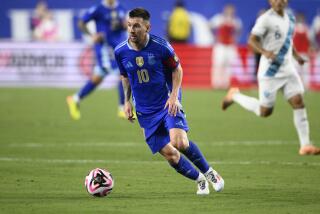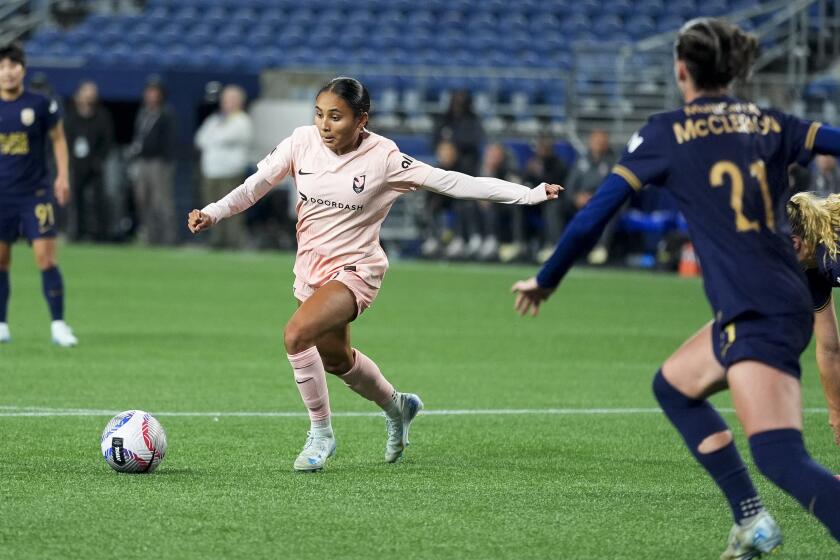WORLD CUP ‘ 90 : Don’t Cry for Argentina; Luck Endures in Overtime : Injury-Plagued Cup Defenders Beat Yugoslavia
- Share via
FLORENCE, Italy — Call it the Hand of God, or call it a twist of fate--by any name there has been something unearthly guiding Argentina to the semifinals of the World Cup.
The defending champions overcame heat, humidity and their own failings for a 0-0 (3-2) victory over Yugoslavia on penalty kicks Saturday before 38,971 at Florence Municipal Stadium.
The near-100 degree heat, coupled with about 50% humidity, sapped any hope that the game would produce the creative, explosive soccer the teams are capable of exhibiting.
In the end, after playing to a draw through 90 minutes of regulation and two 15-minute overtime periods, the players seemed to have difficulty summoning enough energy to kick the ball past the goalkeepers during the penalty kicks. While under normal circumstances a penalty kick is virtually certain to go in, in Saturday’s match only half of the 10 shots found the back of the net.
Argentina prevailed, again almost inexplicably. The team got into this game by beating Brazil in overtime, a game in which Brazil clearly was superior. Argentina will play Italy, a 1-0 winner over Ireland, in Naples on Tuesday.
The Argentine players had only 20 days together to prepare for the World Cup. No sooner did they assemble than most key players suffered injuries. The whole of Argentina was held at rapt attention until it was determined that a blister on a toe of star Diego Maradona would not keep their national treasure from playing.
In keeping with the dramatic script the South Americans have written for themselves, the hero of Saturday’s game, goalkeeper Sergio Goycochea, was himself the backhanded beneficiary of his team’s bad luck.
After losing their first game to Cameroon, Argentina played the Soviet Union. Barely a few minutes into that game Argentine goalkeeper Nery Pumpido suffered a broken leg. Goycochea replaced him and has given up only one goal since.
Goycochea’s diving saves of Yugoslavia’s last two penalty kicks gave Argentina the victory, rendering irrelevant the misses of teammates: Maradona’s muffed left-footed chip shot and Pedro Troglio’s hard shot that hit the right post.
Maradona should have gained an advantage when the player marking him, Refik Sabanadzovic, was expelled from the match in the 31st minute. Sabanadzovic, who pledged to play Maradona closely but cleanly, was given a yellow card for a rough tackle and then another for dissent.
The Yugoslavs pulled a midfielder off the attack to mark Maradona, but even playing a man short the rest of the game they hardly slacked their pace. Yugoslavia, which had the best qualifying record of any of the 13 European teams in the tournament, had three clear scoring chances in the first half to Argentina’s none.
The man busily creating Yugoslavia’s chances was midfielder Dragan Stojkovic. Stojkovic is called the Maradona of the Carpathians because of his mastery of the ball and his deceptive moves. To these comparisons Stojkovic has always demurred.
After Saturday’s game, future comparisons will not be far-fetched. Stojkovic, who will play in the French first division next season, was simply the best player on the field.
Stojkovic further resembled Maradona when he, too, missed his penalty kick by banging a shot off the crossbar.
But it is his hard work that is most impressive. While Stojkovic raced up the wings to jump-start Yugoslavia’s swift counterattack, Argentina seemed content to slog away in the midfield. The Argentines held to this conservative approach even with the man advantage. It created few chances, although Maradona did get his second shot on goal of the tournament in the second half.
Maradona, as has been the norm in the tournament, was the game’s most-fouled player with six, further hampering his ability to maneuver. Maradona’s predicament is made worse by his teammate’s listless play. Argentina’s coach, Carlos Bilardo, has characterized his team as being “Maradona and 10 others;” it appears that Bilardo’s harsh assessment is stinging in its accuracy.
Still, Argentina wins, and that counts for far more than the fitfully brilliant play of teams such as Brazil, Yugoslavia and the Netherlands--all of which have been eliminated.
Often, how Argentina wins is bizarre. Toward the end of the second overtime it appeared that Argentina scored a goal. In the midst of its celebration, the referee ruled a hand ball by Jorge Luis Burruchaga.
Even with the advantage of a televised replay, it was difficult to determine exactly where the ball hit the Argentine player. Yugoslav goalkeeper Tomislav Ivkovic made a diving save and tipped the ball, appearing to hit Burruchaga in the upper chest. The ball dribbled into the goal.
Argentina made up for that with its superior penalty kicks, which the Yugoslav coach attributed to nothing more than good luck.
Maradona, who is at once a superstitious and deeply religious man, agrees that luck is with his limping, fading, come-from-behind team.
“Yes, I think (luck) has been with us,” Maradona said, his swollen left ankle swathed in ice bags and his head encircled with a red headband.
“(But) it is not as if any gifts have been given away. We want to show that Argentina is doing its best. We’ve got to win.”







